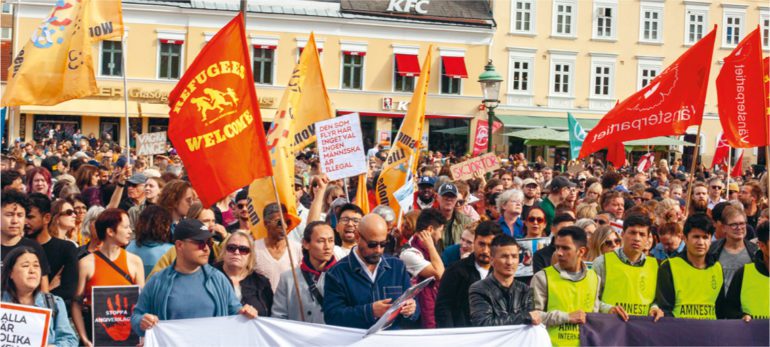By Anna Lundberg. This text is originally in Swedish, and published in Artikel 14, #3 2023. Translation into English by George Farrants.
Should it be possible to carry out so called internal control of foreigners, without restrictions? This is a real issue, given that the Swedish government returns time and again with proposals for new powers for border control and the police. Material collated by FARR relating to the Tidö Agreement makes it clear that a new law has already given the police greater powers at border crossings.
The government has subsequently put forward proposals to increase police powers for internal control, without having sent these proposals out for consultation. Furthermore, the government has set out the terms of reference for an inquiry into the repatriation of people that may lead to further erosion of privacy protection during “internal border controls”.
Artikel 14 asked Anna Lundberg, professor in sociology of law at Lund University, to comment on how the government and its cooperating party the Sweden Democrats have managed the question of internal border control. (Professor Lundberg was commissioned by the previous government to conduct an inquiry into impediments to enforcement, SOU 2017:82.)
Detective work is always required to follow inquiries and supplementary inquiries. Legislation with judicial aspects is so complex that even elected representatives are not always completely sure about what their decisions mean. Further, most legislation has unintended effects.
A person who wants to examine legislation and appreciate its content and possible effects, therefore, must always get into the details. Not only the published results from inquiries and government bills must be meticulously read, but also submissions given during the consultation process.
When I review a legal proposal, it is always after a deep scrutiny of the text. This often means that I must examine proposed legislation line-by-line in collaboration with colleagues at the university, review previous research in the field, and come to conclusions. The results of this process must then be presented in a comprehensible manner. The legislation that FARR discusses was passed by the Swedish parliament on 20 June this year. It gives new powers to the police in regions close to the national border, allowing controls to be carried out “even if there are no justifiable grounds to assume that the person does not have the right to be in the country, or any other particular reason for the control (our translation of the Swedish text).” The law has not been the subject of a consultation procedure since the Inquiry into more effective police actions in regions close to the national border (our translation of the Swedish title) published its conclusions in 2021 after a consultation process held at that time. A new referral to the Council on Legislation was presented on 22 June this year relating to more effective tools for internal controls. These included granting increased powers to the police for apprehension, body searches, and the impounding of passports. These tools can be used during internal controls in general and are not limited to regions close to the border. I discussed these changes in an opinion piece (in Swedish) during the summer. In the piece, I also presented research relating to internal control of foreigners and racial profiling. One point that I did not raise, however, was that the proposals put forward in the referral to the Council on Legislation were from an even older date that the previously mentioned. They are from an investigation from six years ago, known as the Return Inquiry (in Swedish, Återvändandeutredningen conducted in 2017. The proposals that arose from this inquiry underwent a consultation process and some proposals were adopted by the parliament in
May 2021. Now the government has picked up other proposals from this six-year-old inquiry and simply omitted both the inquiry stage and the consultation process since, we can assume, the government considered that these had already been carried out.
It is remarkable that the government in this way is bypassing the review procedure. Opinions given during review rounds are important in ensuring the quality of the legislative process. In particular, such opinions are important when drawing up legislation that concerns people in marginalised positions. This is not least important in questions of human rights, since such rights tend not to be applied in practice for people who live marginalised lives. It is, of course, intended that human rights legislation should protect these people in particular, not lead to them being even more stigmatised. One such group comprises asylum applicants who have been informed of coming expulsion. These are now in many contexts suspected of terrorism, completely without basis. Such citizens are positioned further from the legislative process than others, and meet many obstacles when they try to make their voices heard in societal debate. One fundamental impediment to having one’s opinion listened to is that the people who are the direct targets of the legislation are precisely those who do not have the right to vote. Researchers usually describe this situation as embodying an extensive democratic deficit.
It is also important that the significance of the consultation process not be underestimated when it comes to the curtailment of human rights of those who have been the target of repression, racism, or other injustices. The proposed legislation involves a major risk of treatment that compromises personal integrity in such cases. The consultation process allows voluntary organisations such as FARR to act as representatives in these contexts, not for the people affected but for the general interest of society to ensure that their fundamental human rights are protected. This is vital in a democracy and a state in which the rule of law prevails.
As Artikel 14 has pointed out, the government has presented proposals from a previous inquiry and proceeded to draw up legislation without permitting consultation partners to give their opinions. I suspect that the government believes that the security situation has changed, and that the assessment of proportionality that must be carried out when legislation that compromises integrity is introduced would today come to a different conclusion than that reached by the inquiry in 2017. In other words, the government considers that the invasion of integrity that is involved is more reasonable now than it was when the consultation partners voiced their criticism. However, denying the consultative partners the opportunity to make their opinions known cannot be regarded as anything other than a desire by the government to avoid criticism, probably because it wants the process to progress rapidly.
Further legislation is in the pipeline. A press conference on 31 August described a proposal for the obligatory reporting of undocumented people and a responsibility to determine the judicial status of an applicant. This proposal has been the subject of massive criticism. However, another change that concerns internal control of foreigners has not received as much attention.
The government has appointed Anita Linder to examine the requirement that there must be reasonable grounds to believe that a person lacks the right to be in Sweden, or other particular grounds, before an internal control can be carried out. The government states that Linder’s examination is to be focussed on the idea that it should be possible to carry out a greater number of controls. If Linder follows the terms of reference, the proposal will lead to a further weakening of the already far from satisfactory protection against discrimination in public spaces. The government claims that international obligations to respect human rights are to be considered as protection against discrimination. It chooses, however, to ignore a common problem with maintaining human rights, namely that the international obligations are often not followed in practice. It is important to remember that the obligations have been established to ensure that the rights are actually exercised in real situations.
It is completely unethical to sneak through proposed legislation relating to fundamental rights, which are, furthermore, being undermined as a consequence of an increasingly harsh social climate.








